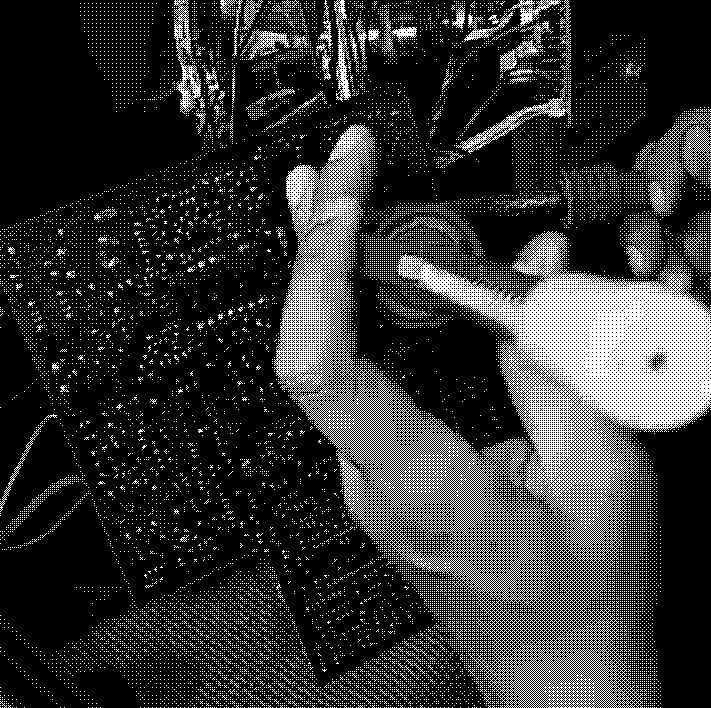⁐ Index
🞿 About
⁋ Publications
⚷ Public PGP Key

Published May 16th, 2025 from Himachal Pradesh, India
Currently, I use a beat-up, cracked old iPhone that I bought off a friend. I would like to have an Android phone so I can degoogle it and stop being spied on. You could say I need a new phone. But I really don't want to buy a new *new* phone.
It is safe to say that the desire for new things is essential to the continuation of the capitalist system. This is a desire we are so used to that it can be easy to forget how bizarre it actually is.
The 'new' object is one that has no history. It has no fingerprints, no marks. It comes in a glossy, self-contained package that is reminiscent of an egg. It needs no explanation. It came from nowhere. It is there only for your evaluation and consumption.
The designs of luxury stores tend to evoke the imagery of limbo. They are abstract, geometric, intensely lit and weirdly empty. They are not places, and the things inside them were not made anywhere. They are intermediaries between you and the product. You should not see the products coming in on palettes through the back, or the workers rearranging them on the shelves. To do so would suggest a friction and history which interferes with your desire. It is for this reason that the moment of payment is always awkward, and we are in a hurry to get the actual counting of coins and tapping of cards over with as soon as possible¹. It is uncomfortable to be confronted with the reality of capitalist exchange.
Such distractions aside, the products are defined ultimately by their relationship to you. In most cases, the manufacturing process is downplayed or concealed entirely. Where an item's brand is invoked, it reflects less on the craftsmanship of others than your good taste in selecting such a well-made item.
The shininess of new things is a useful illustration of this fantasy. New electronics, especially, are always smooth, spotless,and eflective. The gaping blackness of a new iPhone and the white blankness of a new condominium are alike in this respect. These surfaces suggest nothing and reflect everything². They are at once monolithic and passive: they invite the desirer to act upon them, to take possession of them. It is like a set-up for really boring, one-sided sex.
Buddhist ontology suggests that all things are empty in of themselves. Any attributes, meanings, or histories they have come not from within this emptiness, but through relationships with other things. Indeed, smartphones and condominiums don't just pop out of the void one day. They are produced out of a messy, ugly knot of investments, supply chains, and commands, all of which must be hidden for this trick of desire to work. This trick is what anthropologists would traditionally call a fetish.
An item becomes a fetish when we view it primarily through the lens of our delusions and desires. In *The False Coin of Our Own Dreams*, David Graeber (2001) writes that: “in fetishizing an object [...] one is mistaking the power of a history internalised in one’s own desires, for a power intrinsic to the object itself. Fetish objects become mirrors of the beholder’s own manipulated intentions” (2001, 115).
The fetish has rather fallen out of fashion as a theoretical concept, which I think is a shame. It is, in all fairness, a pretty judgy concept. Fetishistic analysis consists, basically, of telling others that they've gotten a little weird about their Bluetooth speaker or cargo bike (or, historically, their scary wooden mask). It is inherently 'objective' in that it identifies a feeling as a delusion and suggests that this spell could or should be broken.
As much as this perspective is clarifying, it can also be very ethnocentric. It will come as no surprise that most early writers on the fetish were more concerned with the magical powers West Africans assigned to wooden masks than how North American masculinity was becoming constituted by a ritualised relationship with motor vehicles. It goes without saying that the feminist, post-colonial, and Queer critiques which have reshaped academia since the late 1970s have been for the best. This shift allowed us to trade off the singular 'correct answers' of scientific rationality for the complex, layered viewpoints that actually make up life on this planet. But just as much as it has allowed new perspectives in, punch-drunk postmodernism can also deprive us of the ability to call bullshit on the manipulations that characterise capitalist society³. This is exactly why fetishistic analysis was used so widely in the bygone tradition of Marxist anthropology.
So, to dust off the fetish for a moment, how might we break the spell that new and shiny things hold over so many of us?
Like any trick, fetishism works a lot less well once you know how it works. It is also very dependent on staging and setting. For this reason, I have a hunch that it is much easier to fetishize a new camera from a glossy stock photo on Amazon.com, than when some guy in a market is trying to flog that same camera to you. In the former case, you are being primed to forget everything about the camera other than that you want it. In the latter, you cannot help but notice somebody is trying to make a buck off of you. Dislocating commodity items from the usual rituals of advertising and acquisition can go a long way.
In my undergraduate honours thesis, I suggested that the experience of salvaging things found in alleyways gives a unique opportunity for 'defetishization':
Dislocated from our familiar monetary, commodified experience of desire, a free and living thing in an alleyway presents in-of-itself: its worth to the salvager is crystallized within the bounds of its physical form. The reinscribed dictat of capital, “that the purpose of life is the acquisition of material things”, falls away: it is useful, or it isn’t. [...] the core fantasy of the commodity fetish is minimized in the moment of salvage. [...] If fetishes are the illusions we project on things through our desire, then this kind of proximity work manages to winnow that fetishism down as much as possible whilst testing the worthiness of our desire by measuring a thing’s real utility to ourselves and to others.
I think something similar, and perhaps even more powerful, happens when you repair an item. The process of repair is intimate and tactile. The mender must feel and examine the broken item so that they can tell what is wrong with it and how to fix it. This makes us confront the actual form and usability of the item, and cut through the veil of fantasy.
Of course, by the time we repair objects, we already have a personal familiarity with them. We have replaced the contextless newness of the shiny thing with the practical histories and associations we have built up with the thing through use. The decision to repair instead of replace is to forgo commodity value and to embrace non-capitalist, sentimental and/or practical values. Indeed, just as the process of repair lets us strip away the harmful illusions of the capitalist fetish, it also allows us to reimbue them with a new, human-centred and liberatory fetishism.
Wait, what?
While analysing fetishism is a useful way to critique capitalism, it is worth remembering that fetishism itself is not 'bad'. It seems to be key to how we think and interact with the world around us. At its most basic level, fetishism is the fixing of an abstract notion onto a tangible thing. That is just basic symbolic thought, part of what makes us human. This is the same principle as language.

Just as much as fetishes can be used to trick and exploit us, they can also be a very powerful medium for collective action and social creativity. The anthropologist David Graeber has written about how those masks in early modern West Africa were used to solemnify trading agreements or peace treaties. Everyone involved would agree that, if they violated the terms of their promise, the supernatural power enshrined in the mask would send a disease or lightning bolt to kill them. In other words, people were vesting the tangle of trust, rights, responsibilities, and sanctions which make up a human society in a meta-human object for the purposes of simplicity, ritual power, and symbolic weight.
The website compost.party is hosted in a decaying smartphone powered by solar energy in an attic in Berlin. It is a wonderful example of the more promising kind of fetish. Despite the name, compost.party is not *really* a party as we would usually define one. But that is precisely why it is far more powerful than, say, a bunch of people standing around drinking and singing karaoke. By investing mutual trust and creativity in this project, the handful of microblogs living on this device have come to constitute a shared experiment in reuse, self-reliance, and in re-embedding the internet in tangible places and forms.
This is an elaborate example, but something similar happens to any item which is created and maintained through interpersonal networks of care, labour, or craftsmanship. Any time I need to clean my glasses, I use the handkerchief that my girlfriend sewed for me, and I think of her. Any time she uses her computer, she does so because her other friends helped replace the power supply. These associations and imaginations are the tendons of connection which make an economics of gifting and mutual aid actually function.
There are all kinds of immediately obvious reasons to repair instead of replace. It saves money, it minimises waste, and it can be very satisfying. But on a far deeper level it also undercuts one of the core myths of the capitalist system. So, if you want to do some damage to global capitalism, go crack some glass screens and solder some wires.
_______________________________________________________________________
¹ Capitalism's embarrassment over its central ritual (the exchange of money) makes for interesting contrast with other economic systems. Consider the competitiveness of gift-giving at a Kwakwaka'wakw potlatch or the pageantry involved in bringing tributes to a Chinese emperor (the tributes themselves always being recorded in minute detail).
² The philosopher Byung Chul-Han (with whom I have a weird, parasocial love-hate relationship with) has identified this sleekness as the contemporary ideal of beauty.
³ I am often skeptical of the trend to describe capitalism as purely an illusory 'dream machine' which sustains its power first and foremost through desires. This appears the case only if you have never had to shoplift food. That is to say, if you are in the economic position that most academics occupy. If you *did* ever need to shoplift, you would find out that just as ever, capitalism is upheld principally through dead eyes, guns and clubs, men in uniform, and bruised women. Thus when we talk about the fetish, we must bear in mind that it is an excuse, not a catalyst.